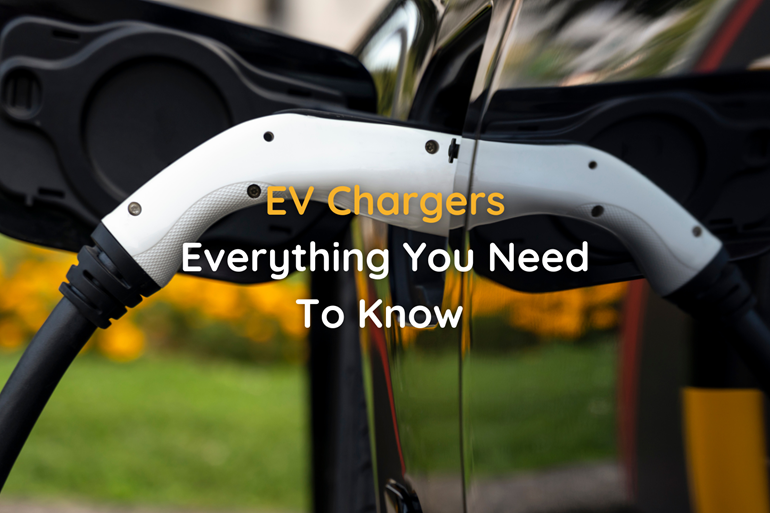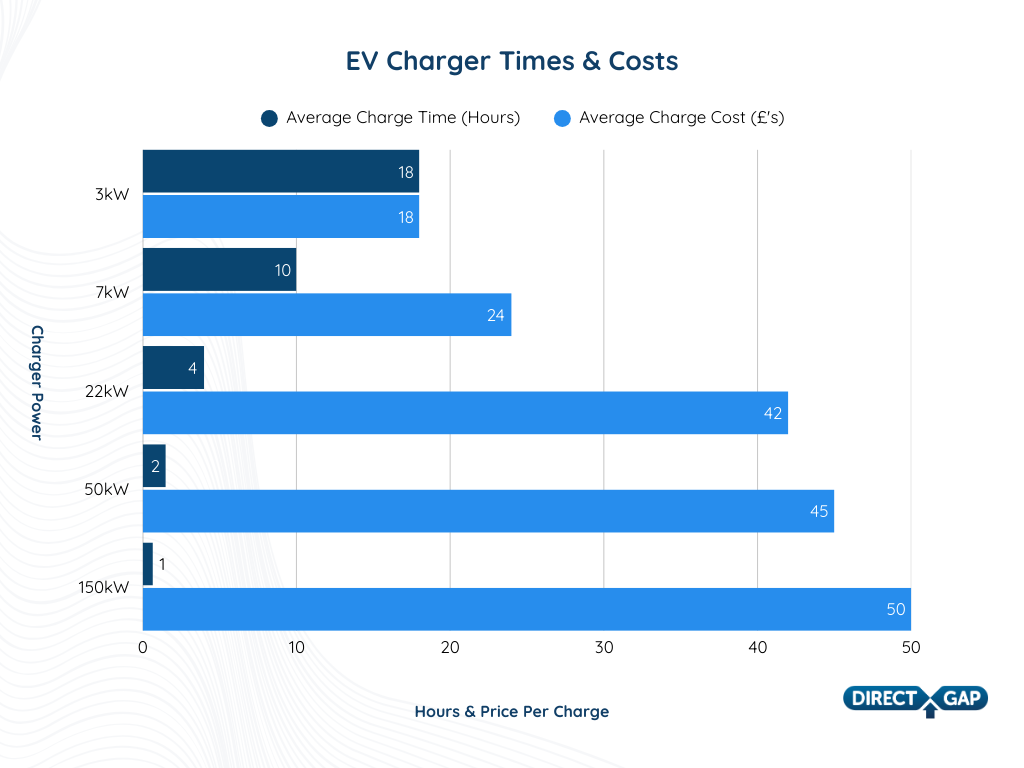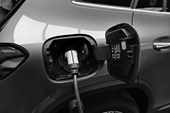
EV Chargers | Everything You Need To Know
Get To Grips With Chargers In Our Latest Guide...
Quick Links
- Introduction
- Do Electric Cars Pay Road Tax?
- How Much Do Electric Cars Depreciate?
- Everything You Need To Know About EV Chargers
- The Different Types Of EV Chargers
- Home Charging Vs Public Charging
- The Cost Of Charging An EV
- Government Grants & Incentives
- Charging Connectors & Compatibility
- How Long Does It Take To Charge?
- Other Information
- Our Final Word
Introduction
Electric vehicles (EVs) are becoming the norm rather than the exception (accounting for more than a fifth of new cars registered). With that shift comes the need for reliable, efficient charging solutions. Whether you're considering an EV or you already own one, understanding how, where, and when to charge is essential.
In the last year, drivers have increased their search for ‘EV chargers’ by 23%, so there's definitely a desire to understand more.
In this article, we’re covering everything you need to know, from different charger types to installation options, costs, and the all-important question of how long it actually takes to charge your car.
First, though, let’s cover some of the basics of electric cars:
Do Electric Cars Pay Road Tax?
Electric, zero and low-emission cars, vans and motorcycles are now subject to the vehicle tax rates that were introduced on 1 April 2025.
Road tax charges for electric cars changed on the 1st of April 2025, with new rates coming into effect. The amount you pay primarily depends on when your car was registered:
- April 1st 2025 Onwards: You’ll pay a lower first-year rate of £10, then you’ll pay the standard rate of £195 from year two onwards.
- 1st April 2017 - 31st March 2025: You’ll pay the new, standard road tax rate of £195.
- 1st March 2001 - 31st March 2017: You’ll pay a rate of £20
How Much Do Electric Cars Depreciate?
Unfortunately, even electric cars are susceptible to depreciation, with a typical loss in value of 15-35% in the first year, rising to 50% after three years of ownership.
As always, the amount your car will lose through depreciation can vary, depending on (but not limited to) make, model, mileage, service history and condition.
We’ve covered electric car depreciation in greater detail in our guide; How Much Do Electric Vehicles Depreciate.
Why Is Electric Car Depreciation Important?
Depreciation can cause negative equity.
Negative equity is where the value of your vehicle falls below the amount you still owe on finance (because the rate of loss is quicker than the rate of your repayments) or the amount it would cost for a replacement, ‘like-for-like model.
If your car is ever declared a ‘write off’ (or ‘total loss’ as it’s known in the car industry) then negative equity could cause significant problems, as your insurer will offer you a final settlement figure equal to the amount your car is worth at the time; if that’s lower than the amount you owe, or the cost of a replacement vehicle, the difference falls to you.
If you’re concerned about this (which is often a worry for most motorists, particularly those driving financed cars), you should consider gap insurance, which pays out the difference so you’re not out of pocket.
Everything You Need To Know About EV Chargers
The Different Types of EV Chargers
Not all chargers are created equal. The speed at which your EV charges depends on the type of charger you use. Broadly, they fall into three categories:
Slow Chargers (Up to 3kW)
- Usually rated at 3kW and often found in home charging setups with a standard three-pin plug.
- Charging time: 8–12 hours for a full charge.
- Best for overnight charging when time isn't an issue.

Whilst slow chargers are just that; much slower than alternatives, they do offer some benefits, including a much lower upfront cost (some can be picked up for £150) and portability, meaning you can keep your charger in the boot and use it anywhere there’s a three-pin plug.
What’s more, when we spoke to some industry experts, they actually recommend slow chargers, particularly for drivers who plan to keep their vehicle long-term. Why? Slower charging is kinder to batteries and prolongs battery life over repeated rapid charging.
We recommend a slow charger that has an inbuilt temperature gauge.
Chargers can get warm during use, which is perfectly normal. However, a temperature gauge offers that extra peace of mind.
Fast Chargers (7kW–22kW)
- The most common home charging option (especially 7kW wallboxes).
- Found at workplaces, supermarkets, and public car parks.
- Charging time: 3–7 hours depending on battery size.
Fast charges are probably the most convenient for daily use. A dedicated charger is added to your home, usually in the driveway, resembling a commercial charger that you might see at a shopping centre or supermarket.
They’ll charge most cars in 3-7 hours, depending on your make and model, plus the type of fast charger you choose. Remember, though, there will be some small trade-off with long-term battery life, which isn’t too much of a concern with lease cars or pcp financed cars (where you would usually be returning the car at the end of the agreement). However, as we’ve mentioned above, it could impact long-term use for drivers who own their car outright, looking to run their car as long as possible.
Fast chargers are mains-connected, which means they’ll need to be installed by a qualified and registered electrician.
Rapid & Ultra-Rapid Chargers (50kW–350kW)
- Found at motorway services and high-traffic public charging stations.
- Charging time: 20–60 minutes for an 80% charge.
- Only compatible with EVs that support rapid charging.
Zap Map provides a national map of all rapid and ultra-rapid charging points in the UK. On average, charging points at motorway services and ‘petrol’ stations usually charge around 70p to 85p per kWh.
Top tip: Rapid chargers slow down after 80% to protect battery health, so it’s often quicker to stop at 80% rather than wait for a full charge.
Home Charging vs Public Charging
Around 80% of EV charging is done at home, which is a testament to its convenience. If you can install one, a fast charger will significantly simplify your EV ownership.
That said, public chargers are a great consideration, especially if you’re heading out on a road trip. Here are the pros and cons of both:
Home Charging
- More cost-effective per kWh.
- Charge overnight at off-peak rates.
- No need to queue or worry about charger availability.
- Requires installation of a dedicated charging point.
- Initial cost (though grants may help—more on that below).
Public Charging
- Essential for long journeys or those without home charging.
- Rapid chargers get you back on the road quickly.
- Increasing availability across the UK.
- Can be more expensive per kWh.
- Some networks require subscriptions or apps.
The Cost of Charging an EV

EV charging costs vary depending on where and how you charge, particularly if you charge your car at services or fuel stations. What’s more, there’s quite a bit of variation on energy tariffs, so it pays to do your research if you’re primarily charging at home.
Here’s an overview of the different types of charging and their cost:
Home Charging
Expect to pay around £0.30 per kWh, meaning a full charge for a typical EV (60kWh battery) costs around £18.
Public Fast Chargers
Prices range from £0.40 to £0.70 per kWh, meaning a 60kWh charge could cost between £24 and £42.
Rapid Charging
Rapid charging can be as high as £0.85 per kWh, meaning a full charge could cost over £50.
Want to save money? Many energy providers offer EV-specific tariffs with cheaper overnight rates, sometimes as low as £0.07 per kWh.
For official UK energy rates, check Ofgem.
Government Grants & Incentives
Given the government's recent relaxing of EV targets, the chances are that most grant opportunities will be reduced in the mid term; however, there are still some incentives for drivers to purchase an electric car:
- EV Chargepoint Grant: Up to £350 off the cost of installing a home charger (available for flat owners and renters).
- Workplace Charging Scheme: Grants for businesses to install EV chargers.
For the latest information on all grants available and to find a specific grant, visit GOV.UK.
Charging Connectors & Compatibility
Aside from some older generation electric cars, such as the Nissan Leaf, most UK EVs use Type 2 connectors. This is the case for charging infrastructure throuhgout the UK too, so there’s not too much to worry about.
If your planning to charge your car at home, using the aforementioned three pin ‘Slow Chargers’, make sure it has the right connection for your vehicle if you’re buying it online (particularly Amazon, which sells chargers for all types of electric vehicle).
Here’s the most common charging connector information at a glance:
- Type 2: The standard home and public charging connector in the UK.
- CCS (Combined Charging System): Used for rapid charging.
- CHAdeMO: Mostly found on older Nissan Leafs but is being phased out.
Europe also uses Type 2 chargers, so you should have some peace of mind if you’re travelling to the mainland. However, we always recommend carrying a portable charger in the boot (such as a Slow Charger or ‘trickle charger’ as they’re also known).
How Long Does It Take to Charge?
The time it takes to charge an EV depends on battery size and charger speed.
|
Charger Type |
Power |
Charging Time (60kWh battery) |
|
3kW Slow Charger |
3kW |
12–18 hours |
|
7kW Fast Charger |
7kW |
8–10 hours |
|
22kW Fast Charger |
22kW |
3–4 hours |
|
50kW Rapid Charger |
50kW |
60–90 minutes |
|
150kW Ultra-Rapid Charger |
150kW+ |
20–40 minutes |
Other Information
Can You Charge in the Rain?
Yes! EV chargers are weatherproof, so there’s no risk of electrocution. They’re designed to withstand rain, snow, and even sub-zero temperatures. Just make sure the charging cable is securely connected.
Common Myths About EV Charging
"You can’t charge an EV in cold weather."
You can, but charging is slightly slower in low temperatures.
"You must fully charge your battery every time."
No! In fact, keeping it between 20-80% extends battery life.
"Public charging is impossible to find."
The UK has over 50,000 public chargers, with more added every week.
The Future of EV Charging
EV charging is evolving fast, as Avent suggest, there are plenty of exciting innovations on the horizon:
- Wireless Charging: Charging without cables, much like a wireless phone charger. Prototypes suggest a wireless ‘plate’ which remains fixed on your driveway, meaning your car will charge automatically, every time you park up outside your home.
- Vehicle-to-Grid (V2G): Your EV could supply power back to the grid when demand is high.
- Solar-Powered Chargers: Using solar panels to reduce reliance on the electricity grid.
- Solid State Batteries: Solid state batteries promise faster charging, more efficient usage and a longer life.
Our Final Word
EV charging might seem complex at first, but once you understand the basics, it becomes second nature. Whether you're charging at home, on the go, or planning a long trip, knowing your options can save you time and money.
With the UK’s charging network expanding rapidly, going electric is easier than ever. It’s no wonder only 3% of drivers say they’d switch back to fossil fuel. So, if you haven’t already made the switch, what’s stopping you?
If you have any questions regarding EVs and charging, please don’t hesitate to get in touch. DM Luke using our social media channels. We’re always happy to help.
Pin It!













